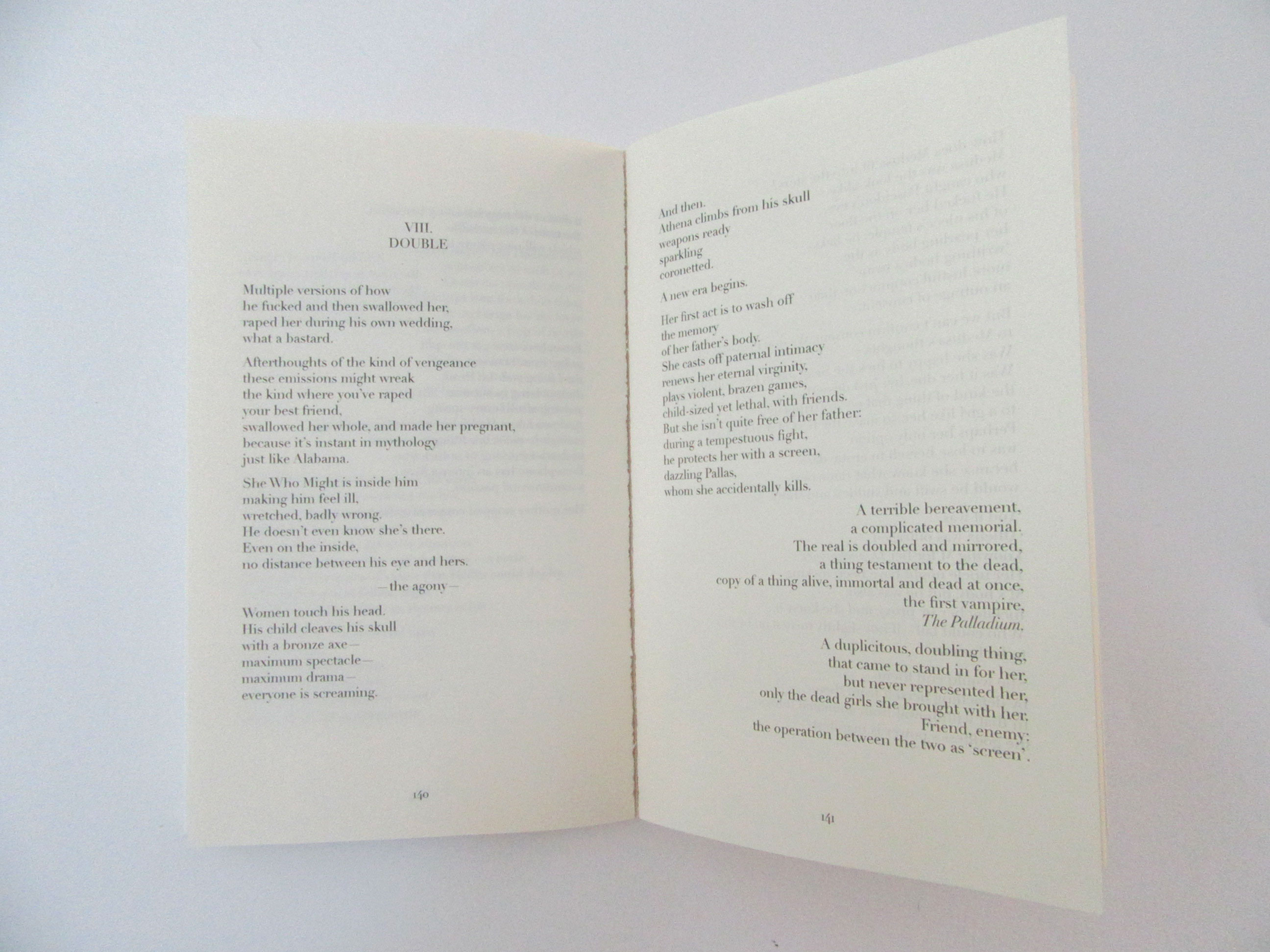Isabella Streffen
FABULAE. HOW IT BEGINS, 2022
FABULAE. HOW IT BEGINS, 2022
.



But how did it all begin?
With secret dalliances
with sexualised embraces
with extravagant and amorous
days and nights and years when all that existed
was embracing
the embracing was the point of everything
he and she, parts of the same
FABULAE is an experiment in close reading, responding to the question of beginning with a challenge to the philosophy of myth. With Roberto Calasso as her intimate companion, Isabella Streffen appropriates Calasso’s Marriage of Cadmus & Harmony, using his methods to counter his text by foregrounding re-reading, inserting the silent, absent voices of women, connecting the foundation of narrative to contemporary discussions of structural violence, gender, and consent. FABULAE interrogates semiotics, gambles with theology, questions beauty, necessity, mortality, consciousness, form, possession, truth, and art. It reframes mythic gesture, authority, ceremony, paradise, and the birth of language. The reader meets a complicated man, wanders through Ariadne’s fates, encounters the Pythia, the Atreidae, Persephone, the Gods of the Silent Pact, and the doubling of Athena and Helen. The telling of stories begins with a dispute over a girl, a slip of tense, a distraction, a switch. Its characters change and the exchange is the condition of narrative. The rest is slippery radiance.
‘At times incandescent, at times intoxicated, always illuminating, Isabella Streffen’s compelling and vibrant text employs a strategy of ‘writing through’ Roberto Calasso’s explorations of Greek myths. By foregrounding reading and rereading as a creative act, FABULAE forces its readers to interrogate any old and habitual ideas we might have about these stories, undercutting any pretence to any easy familiarity with them, and sending us off on a visceral odyssey of delirious desire, sexual violence, sacrificial animals, pooling blood, rageful women, and the baleful influence on human life of the boredom of the gods.’
–>Andrew Key
Isabella Streffen engages with experimental criticism, the politics and poetics of perception, and the slippery territories of love through objects, encounters, and texts. She has illuminated Hadrian’s Wall from end to end, staged a dog-fight with prototype drones Hawk and Dove in the Library
of Congress, camouflaged tourists in Monet’s Garden, chased vampires in the Palais Garnier, followed Sophie Calle to Venice in a blonde wig, looked at the world through the lens of a cow, performed in cabaret en unicorne, tempted panthers from their cages with bespoke scent, transformed apples into gold for the most deserving, taxonomised her desires, and conducted a love affair with a bot.
Fabulae is selected as a ‘book of the year’ by Rose Ruane in Lunate and as a Granta Book of the Year by Eley Williams.
With secret dalliances
with sexualised embraces
with extravagant and amorous
days and nights and years when all that existed
was embracing
the embracing was the point of everything
he and she, parts of the same
FABULAE is an experiment in close reading, responding to the question of beginning with a challenge to the philosophy of myth. With Roberto Calasso as her intimate companion, Isabella Streffen appropriates Calasso’s Marriage of Cadmus & Harmony, using his methods to counter his text by foregrounding re-reading, inserting the silent, absent voices of women, connecting the foundation of narrative to contemporary discussions of structural violence, gender, and consent. FABULAE interrogates semiotics, gambles with theology, questions beauty, necessity, mortality, consciousness, form, possession, truth, and art. It reframes mythic gesture, authority, ceremony, paradise, and the birth of language. The reader meets a complicated man, wanders through Ariadne’s fates, encounters the Pythia, the Atreidae, Persephone, the Gods of the Silent Pact, and the doubling of Athena and Helen. The telling of stories begins with a dispute over a girl, a slip of tense, a distraction, a switch. Its characters change and the exchange is the condition of narrative. The rest is slippery radiance.
‘At times incandescent, at times intoxicated, always illuminating, Isabella Streffen’s compelling and vibrant text employs a strategy of ‘writing through’ Roberto Calasso’s explorations of Greek myths. By foregrounding reading and rereading as a creative act, FABULAE forces its readers to interrogate any old and habitual ideas we might have about these stories, undercutting any pretence to any easy familiarity with them, and sending us off on a visceral odyssey of delirious desire, sexual violence, sacrificial animals, pooling blood, rageful women, and the baleful influence on human life of the boredom of the gods.’
–>Andrew Key
Isabella Streffen engages with experimental criticism, the politics and poetics of perception, and the slippery territories of love through objects, encounters, and texts. She has illuminated Hadrian’s Wall from end to end, staged a dog-fight with prototype drones Hawk and Dove in the Library
of Congress, camouflaged tourists in Monet’s Garden, chased vampires in the Palais Garnier, followed Sophie Calle to Venice in a blonde wig, looked at the world through the lens of a cow, performed in cabaret en unicorne, tempted panthers from their cages with bespoke scent, transformed apples into gold for the most deserving, taxonomised her desires, and conducted a love affair with a bot.
Fabulae is selected as a ‘book of the year’ by Rose Ruane in Lunate and as a Granta Book of the Year by Eley Williams.
212 pages
120 mm x 190 mm
80 mm French flaps (cover)
Format: Paperback
ISBN 978-1-910055-93-9
£12.00
Next Book ->
120 mm x 190 mm
80 mm French flaps (cover)
Format: Paperback
ISBN 978-1-910055-93-9
£12.00
Next Book ->